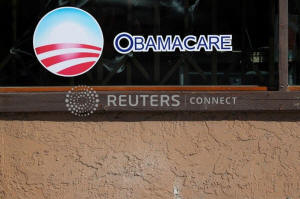U.S. appeals court sidesteps major Obamacare ruling
 Send a link to a friend
Send a link to a friend
 [December 19, 2019]
By Lawrence Hurley [December 19, 2019]
By Lawrence Hurley
WASHINGTON (Reuters) - A U.S. appeals court
ruled on Wednesday that a component of the Obamacare law is
unconstitutional, but dodged a major ruling by stopping short of
declaring that the rest of the landmark 2010 healthcare statute must
also be struck down.
The New Orleans-based 5th U.S. Circuit Court of Appeals ruled on a 2-1
vote that the law's individual mandate that directed Americans to obtain
health insurance - a provision already gutted by Republican-backed
legislation passed in Congress - was unlawful.
The court, however, avoided answering the key question of whether the
rest of the law can remain in place or must be struck down, instead
sending the case back to a district court judge for further analysis.
That means the fate of the signature domestic achievement of Democratic
former President Barack Obama remains in limbo.
Writing for the majority, Judge Jennifer Walker Elrod said that
Texas-based U.S. District Court Judge Reed O'Connor must "employ a
finer-toothed comb" to determine if the entire law must be struck down.

In 2018, O'Connor ruled the entire law was unconstitutional.
Elrod wrote that it may be that the law does eventually have to be
struck down in full, but "it is no small thing for unelected,
life-tenured judges to declare duly enacted legislation passed by the
elected representatives of the American people unconstitutional."
The dissenting judge, Carolyn Dineen King, said she would have found
that the challengers had no legal standing to bring the lawsuit. She
also said the rest of the law could be upheld even if the individual
mandate was unconstitutional.
The law has drawn Republican ire since its passage. Congressional
Republicans tried and failed numerous times to repeal it, and the Trump
administration has taken several actions to undermine it.
"The 5th Circuit correctly held that the individual mandate is
unconstitutional, and we look forward to the opportunity to further
demonstrate that Congress made the individual mandate the centerpiece of
Obamacare and the rest of the law cannot stand without it," said Texas
Attorney General Ken Paxton, a Republican who leads the legal challenge
brought by 18 conservative-led states.
President Donald Trump, a Republican, said the decision would not change
the current U.S. healthcare system.
[to top of second column]
|

A sign on an insurance store advertises Obamacare in San Ysidro, San
Diego, California, U.S., October 26, 2017. REUTERS/Mike Blake

House Speaker Nancy Pelosi said Democrats would fight Republican
efforts to rollback Obamacare.
“Tonight’s ruling is a chilling threat to the 130 million Americans
with pre-existing conditions and every other family who depends on
the lifesaving protections of the Affordable Care Act," she said in
a statement.
California Attorney General Xavier Becerra, who heads a coalition of
20 Democratic-led states defending the law, said the ruling means
Trump "got the gift he wanted -- uncertainty in the healthcare
system and a pathway to repeal."
California will appeal the decision to the Supreme Court, a
spokeswoman for the state attorney general said.
Obamacare has helped roughly 20 million Americans obtain medical
insurance either through government programs or through policies
from private insurers made available in Obamacare marketplaces.
Republican opponents have called the law an unwarranted intervention
by government in health insurance markets.
In 2012, the Supreme Court narrowly upheld most Obamacare provisions
including the individual mandate, which required people to obtain
insurance or pay a financial penalty. The court defined this penalty
as a tax and thus found the law permissible under the Constitution's
provision empowering Congress to levy taxes.
In 2017, Trump signed into law a tax bill passed by a Republican-led
Congress that eliminated the financial penalty under the individual
mandate.
The 2017 law means the individual mandate can no longer be
interpreted as a tax provision and is therefore unlawful, the
appeals court concluded in Wednesday's ruling.
Trump's administration supported the legal challenge and declined to
defend the law in court.
(Reporting by Lawrence Hurley; Additional reporting by Nate Raymond;
Editing by Leslie Adler and Lisa Shumaker)
[© 2019 Thomson Reuters. All rights
reserved.]
Copyright 2019 Reuters. All rights reserved. This material may not be published,
broadcast, rewritten or redistributed.
Thompson Reuters is solely responsible for this content. |